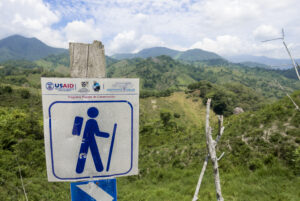Washington, D.C.—The Washington Office on Latin America (WOLA) and other activists criticized General Motors officials visiting Colombia to explore a labor dispute for failing to meet with hunger strikers demanding compensation for work-related injuries.
In protest of their dismissal for work-related injuries, 13 former employees of a General Motors plant in Bogota, Colombia, have been on a hunger strike in front of the U.S. Embassy for more than twenty days. They are demanding that GM’s subsidiary—Colmotores—reinstate and compensate them. A high-level GM delegation is in Colombia, but the delegation has not met with the hunger strikers.
“GM cannot allow its subsidiary to refuse to deal with this issue,” said Gimena Sanchez-Garzoli, WOLA Senior Associate for the Andes. “It is their responsibility to meet with the workers and find a proper solution to their demands.”
While GM refuses to negotiate, electricity in the hunger strikers’ tent has been cut off, reportedly in response to a complaint by the U.S. Embassy, thus leaving workers who are diabetic with no refrigeration for their medicine.
These events take place in a larger context. More than a year ago, President Obama announced a U.S.-Colombia Labor Action Plan. The plan was designed to pave the way for passage of the U.S.-Colombia Free Trade Agreement (FTA) by addressing labor violence in the country. Despite some steps forward, violence against trade unionists has continued to plague Colombia, and even relatively simple complaints involving small groups of workers are being met with serious resistance from employers. WOLA urges the United States and Colombia to take bolder steps to implement the Labor Action Plan.
“The United States, as Colombia’s trading partner, must send a message that it expects the Colombian government and Colombian employers to respect trade unionists’ lives and basic labor rights,” stated Sanchez-Garzoli. “The United States and Colombia promised workers that big changes would take place with the U.S.-Colombia Labor Action Plan. The cruel way in which these ex-GM workers were treated by a subsidiary to a U.S. company, and the failure to hold employers to internationally recognized labor standards, is indicative of the continuing labor rights problems in Colombia as this FTA moves forward.”
In April, President Obama announced at the Summit of the Americas in Cartagena that the U.S.-Colombia FTA was moving forward based upon their determination that Colombia had met key aspects of the Labor Action Plan. Since the Summit, killings and death threats against the labor activists in the priority sectors outlined in the Labor Action Plan have increased. One such high profile murder was of Daniel Aguirre, who steadfastly advocated for direct contracts in the sugar sector. A recent WOLA visit to Colombia found that workers in the oil palm, sugar, and port sectors are regularly fired, threatened, and mistreated for simply attempting to affiliate themselves with trade unions.
WOLA supports the hunger strikers in calling on the U.S. and Colombian governments to act swiftly to get GM to meet their demands. “The governments must also act immediately to protect trade unionists and achieve justice in trade union killings,” said Sanchez. “The United States must press Colombia to implement real labor reforms in the sugar, port, mining, flower, and oil palm sectors.”
Contact:
Gimena Sanchez-Garzoli
202-797-2171
press@wola.org
Photo by Witness for Peace

